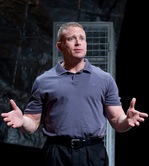SITE GUIDE
SEARCH
REVIEWS
REVIEW ARCHIVES
ADVERTISING AT CURTAINUP
FEATURES
NEWS
Etcetera and
Short Term Listings
LISTINGS
Broadway
Off-Broadway
NYC Restaurants
BOOKS and CDs
OTHER PLACES
Berkshires
London
California
New Jersey
DC
Connecticut
Philadelphia
Elsewhere
QUOTES
TKTS
PLAYWRIGHTS' ALBUMS
LETTERS TO EDITOR
FILM
LINKS
MISCELLANEOUS
Free Updates
Masthead
A CurtainUp Review
ReEntry
| Right now, I'm just happy that I'm not being shot at. But at the same time I'm kinda upset that I don't have anyone to shoot at. —John
|

Joseph Harrell, the commissioned officer and narrator
(Photo: Mark Garvin) |
Over the course of a year, Ackerman and Sanchez interviewed many veterans who became integral to the development of the play. It is indeed their voices that provide the stark authenticity that makes this play so powerful. But it is Sanchez's adroit direction of a talented ensemble cast that makes the play riveting and, yes, even at times entertaining.
Joseph Harrell is the commissioned officer who also serves as the narrator. He goes to conferences and lectures parents on the difficulties their children will have when returning from war. But he also reveals the personal demons that haunt him.
Sheila Tapia is Liz, the liberal sister trying to explain to herself and others why she has two brothers, Charlie and John, who are deployed. She sends them packages and tries not to think about them getting hurt.
The boys' Mom (Sameerah Luqmaan-Harris) thinks it's great to have sons in the Marines; "John's an engineer, and building things and blowing things up and that's great" She just doesn't like people shooting at her children.
John (PJ Sosko) has 30 or 40 people under him, and he feels deeply responsible for their welfare. But he himself is suffering from Post Traumatic Stress Disorder. He has no patience with civilians and their petty problems and is on the verge of explosion.
John's brother, Charlie (Bobby Moreno) seems to have joined the Marines because he could find nothing better to do than follow in his brother's footsteps. He comes home to find that his girlfriend has been cheating on him. He is more concerned with his motorcycle than his purple heart, something "nobody wants to get".
Each of these characters (and a few more) gives testimony as they stand on an almost bare stage. They only occasionally interact. Their powerful performances are heartrending, even when delivered in the calmest of tones — both for the emotions that lie just beneath the surface and for the failed attempts at denying them.
To civilians living in the liberal Northeast, the characters in ReEntry have a naiveté that can be both endearing and annoying. These people are all patriotic, law-abiding and dutiful. But they seem oblivious to the larger world that exists beyond their military circle. In many ways the Marines reveal how much they actually love to fight, a sentiment that should surprise no one, but somehow does when expressed onstage.
The genius of ReEntry is that it lets us venture into the military mind in a way that is free of judgment or editorializing (at least not in any too evident way). In the end, this is more terrifying than a fictional story with a definite point of view could ever be.
|
ReEntry By Emily Ackerman & KJ Sanchez Directed by KJ Sanchez Cast: Joseph Harrell (CO), Sameerah Luqmann-Harris (Mom), Bobby Moreno (Charlie), PJ Sosko (John), Sheila Tapia (Liz) Scenic & costume Designer: Marion Williams Lighting Designer: Thom Weaver Sound Designer: Zach Williamson Running Time: 90 Minutes, no intermission Urban Stages 259 West 30 Street (between 7th and 8th Avenues). 212.868.4444 www.urbanstages.org From 2/06/10; opening 2/11/10; closing 3/07/10 Wednesday - Saturday at 8PM; Saturday — Sunday at 2PM & Monday 2/08/10 Tickets: $40 ($25 during preview through March 8, 2010). Student Rush: $10 with valid ID 10 minutes before curtain (based on availability) Reviewed by Paulanne Simmons Feb. 8, 2010 |
|
REVIEW FEEDBACK Highlight one of the responses below and click "copy" or"CTRL+C"
Paste the highlighted text into the subject line (CTRL+ V): Feel free to add detailed comments in the body of the email. . .also the names and emails of any friends to whom you'd like us to forward a copy of this review. You can also contact us at Curtainup at Facebook , Curtainup at Twitter and at our Blog Annex |
|
Subscribe to our FREE email updates with a note from editor Elyse Sommer about additions to the website -- with main page hot links to the latest features posted at our numerous locations. To subscribe,
E-mail: esommer@curtainup.comesommer@curtainup.com
put SUBSCRIBE CURTAINUP EMAIL UPDATE in the subject line and your full name and email address in the body of the message -- if you can spare a minute, tell us how you came to CurtainUp and from what part of the country. |





